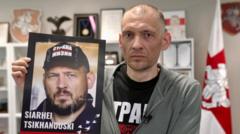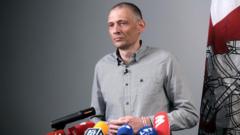In a significant legal development, Pritam Singh, the leader of Singapore’s Workers' Party, has been found guilty of perjury by a local court. However, he will still be eligible to participate in the upcoming election scheduled by November 23, despite the potential damage to the party's image.
Opposition Leader in Singapore Convicted of Perjury but Eligible to Contest in Upcoming Election

Opposition Leader in Singapore Convicted of Perjury but Eligible to Contest in Upcoming Election
Pritam Singh, head of the Workers' Party, fined for lying under oath but remains in politics amid party challenges.
On February 17, 2025, a Singaporean court ruled against Pritam Singh, imposing a fine of 7,000 Singaporean dollars (approximately $5,220) for each of the two counts of lying under oath during parliamentary proceedings. Singh, who became the first formally recognized opposition leader after a historic electoral showing in 2020, intends to appeal the verdict. Notably, under Singapore’s legal framework, he will not be disqualified from office since the cumulative fine does not exceed the constitutional threshold that would prompt a five-year ban.
The case stemmed from Singh's involvement in a broader scandal involving fellow Workers' Party member Raeesah Khan, who confessed to making false statements in Parliament regarding a sexual assault incident. This revelation led to a parliamentary investigation, resulting in Singh facing accusations of providing false testimony during the inquiry.
Political analyst PN Balji has questioned whether the situation warranted court proceedings, arguing that the parliamentary committee should have managed the case through internal reprimands instead. Nevertheless, the trial began last November and culminated with Judge Luke Tan's verdict, with the prosecution advocating for the maximum penalty.
The current atmosphere in Singapore's political landscape has been turbulent, with various scandals surfacing over the past couple of years, including instances of corruption and ethical misconduct by high-ranking officials. The upcoming election will mark a pivotal moment as the ruling People’s Action Party (PAP) prepares to face voters for the first time under the leadership of new Prime Minister Lawrence Wong, who succeeded Lee Hsien Loong, a long-standing political figure.
As Singapore navigates these challenges, the Workers' Party, under Singh's leadership, aims to position itself as a crucial player in a nation traditionally dominated by the PAP. Singh's insistence on the importance of a balanced political system remains central to his party's strategy, even as they grapple with the implications of this verdict in the lead-up to the elections.
Singapore's political waters are indeed becoming more complex, and this ongoing saga will likely have far-reaching implications for both the Workers' Party and the PAP as they prepare to address a changing electorate.
The case stemmed from Singh's involvement in a broader scandal involving fellow Workers' Party member Raeesah Khan, who confessed to making false statements in Parliament regarding a sexual assault incident. This revelation led to a parliamentary investigation, resulting in Singh facing accusations of providing false testimony during the inquiry.
Political analyst PN Balji has questioned whether the situation warranted court proceedings, arguing that the parliamentary committee should have managed the case through internal reprimands instead. Nevertheless, the trial began last November and culminated with Judge Luke Tan's verdict, with the prosecution advocating for the maximum penalty.
The current atmosphere in Singapore's political landscape has been turbulent, with various scandals surfacing over the past couple of years, including instances of corruption and ethical misconduct by high-ranking officials. The upcoming election will mark a pivotal moment as the ruling People’s Action Party (PAP) prepares to face voters for the first time under the leadership of new Prime Minister Lawrence Wong, who succeeded Lee Hsien Loong, a long-standing political figure.
As Singapore navigates these challenges, the Workers' Party, under Singh's leadership, aims to position itself as a crucial player in a nation traditionally dominated by the PAP. Singh's insistence on the importance of a balanced political system remains central to his party's strategy, even as they grapple with the implications of this verdict in the lead-up to the elections.
Singapore's political waters are indeed becoming more complex, and this ongoing saga will likely have far-reaching implications for both the Workers' Party and the PAP as they prepare to address a changing electorate.



















